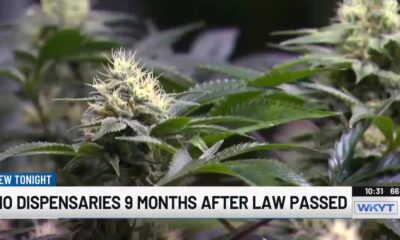While many licensed cannabis operators threw significant resources at expanding in Florida in anticipation of an adult-use market being legalized, Florida-based Cansortium Inc. (CSE: TIUM.U) (OTCQB: CNTMF) held steady, which ultimately looked like the right move after recreational marijuana failed at the ballot box.
CEO Robert Beasley said his company now has an edge heading into what could be a heady year of mergers and acquisitions.
Beasley recently spoke with Green Market Report about his top priorities heading into 2025.
This interview has been edited for length and clarity.
What hurdles and business obstacles do you expect Fluent is going to have to deal with and overcome in 2025?
Florida is going to be tough. We’re looking at a total knife fight.
It was a gold rush into this state in the anticipation of Amendment 3 passing. A lot of folks came in, bought up those smaller licenses, put a bunch of stores on the ground. Green Dragon’s a great example of that. They come in and dropped 34 stores overnight, almost. That’s a build-it-and-they’ll-come philosophy.
Well, we built it, and they didn’t come.
Now, our company didn’t do any of that. I decided I would catch it later, that I could not expend financial sums of this company based on a political outcome, because political outcomes are so uncertain.
Now all that supply’s got to come into the market, and it’s going to compress price. We started seeing it Nov. 6, and it’s going to continue until these players will kind of fold under.
When we did this transaction (with RIV Capital and Scotts Miracle-Gro), we acquired a bunch of cash. We’re getting a lot of calls, a lot of interested Florida players saying, “Hey, do you want to talk?” And it’s because we’ve gone up and everybody else is going down now. I’ll admit our sales are also being impacted, but we just happened to have transacted our way into a big cash position right as that happened. Call it luck.
So we’re anticipating a 10%-12% decrease in sales over the year. I’ve been trying to figure out how to publish that, because the winds are against us. The bell has rung, and we are going to have to just hunker down.
Along those lines, what sort of ripple effects are you expecting in the Florida market? Are you expecting any other operators to actually go under or go up for sale?
They won’t go under. The consolidation appetite is still pretty heavy. And we’re seeing more and more new money come in every day. You’re seeing a lot more of that creativity. And so these players won’t disappear. They’ll just be consolidated.
And we’re hoping to be a part of that. We’re buying, we’re out there ready to eat. We’re going to have to grow behind the curtain, and that means more M&A. For instance, we would buy someone a little bit smaller than us, let’s say an 11-store outfit or a smaller grow outfit.
And then we’ve got to get rid of that license. The crazy thing is license price. When I first started in this business, the license price was $50 million, and now it’s $4 million. Pretty soon in Florida, you’ll be able to get a license for $100,000, like you can a liquor license. And then what?
Any other legislative items in Tallahassee that you’re hoping are maybe going to get through this year to help out the Florida cannabis business industry at all?
Everything that’s being proposed now is kind of a whiplash from Amendment 3. I anticipate THC caps, store caps being proposed. Now, don’t get me wrong, as a business person, both of those are reasonable – if done reasonably. Do we want store caps? Well, no, but do we want to be Colorado? No, we don’t want to be that either.
THC cap? What we’re doing to this plant now is a little bit murderous. We’re convincing a plant that used this chemical element as a deterrent, as a pesticide, and we convinced it to produce 32% of its total volume. We could probably back off of that.
How do you feel heading into 2025 about the prospects for Fluent? Are you confident, for instance, that the rescheduling process and the nullification of 280E is going to be completed under the Trump administration?
I am. I think that that was one of the benefits of the cannabis industry from the election. I don’t know that we had a bad choice as far as candidate, because either candidate seemed to be supportive, or in Trump’s case, maybe at least agnostic to cannabis, which is sometimes the best you can hope for out of a politician.
And the process had already commenced. My concern is, what next? Does (marijuana) become an FDA-regulated product? Does that mean are we a pharmacy now? Do we have pharmacists in our stores? We have that requirement in both Pennsylvania and New York, and it adds a tremendous economic burden because pharmacists in that employee class, you’re not in cannabis anymore, you’re competing with Walgreens and CVS and so forth, and they’re very aggressive with their pharmacists, so that could be a problem.
The benefits to rescheduling are obvious and on its face, the detriments are not as obvious.

 California Cannabis Updates1 year ago
California Cannabis Updates1 year ago
 Breaking News1 year ago
Breaking News1 year ago
 best list1 year ago
best list1 year ago
 Business12 months ago
Business12 months ago
 cbd1 year ago
cbd1 year ago
 Bay Smokes1 year ago
Bay Smokes1 year ago
 cannabis brands12 months ago
cannabis brands12 months ago
 autoflower seeds12 months ago
autoflower seeds12 months ago

















































